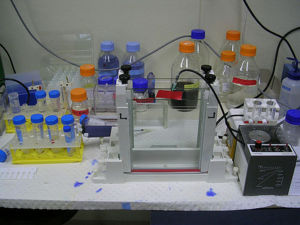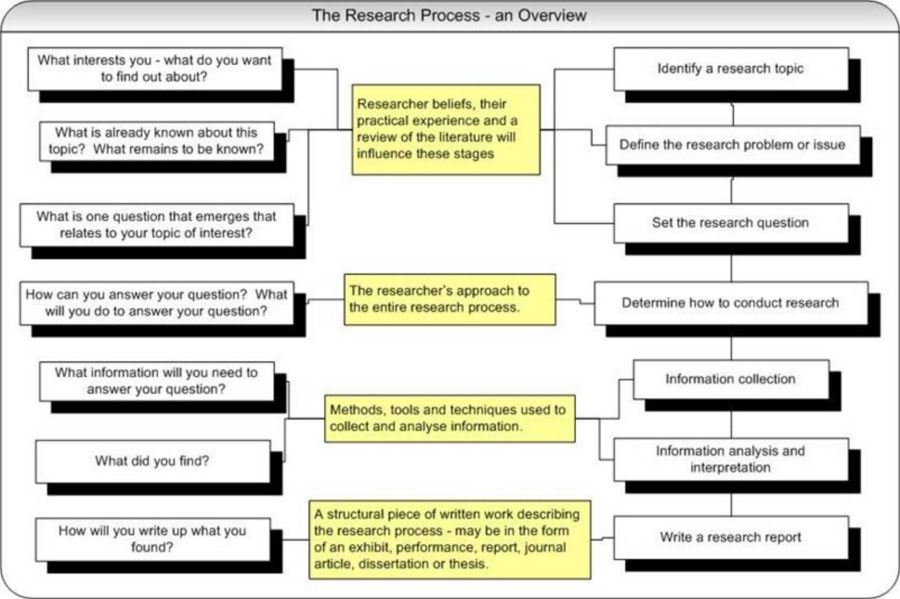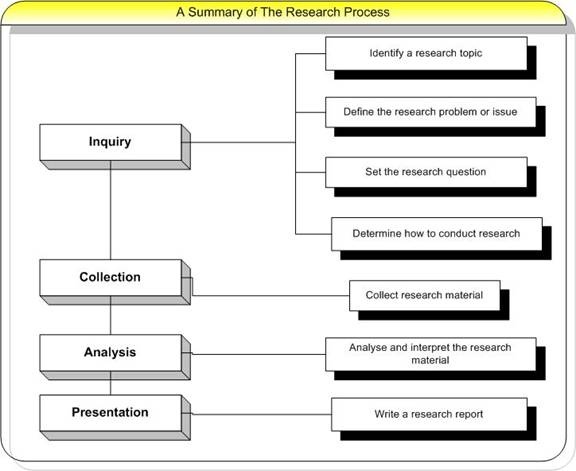How to get started on research

Contents
- 1 Getting started
- 2 Defining research
- 3 Reflection
- 4 Overview of research process
- 5 What is the research process?
- 6 The research question
- 7 Evaluating a research question
- 8 Finding information - literature searching
- 9 Sources of information
- 10 Web Resources
- 11 Research methods
- 12 Methodology and research material
- 13 Ways of gathering material
- 14 Sampling
- 15 Cultural considerations
- 16 Ethical and legal considerations
- 17 Organisation of research materials
- 18 Presentation of research findings
- 19 Summary of the research process
- 20 Web Resources
- 21 References
Getting started
An introduction to research including ways of acquiring knowledge and factors that influence research.
What do you think about when you hear the term 'research'? Do you think about:
- scientists at work in the laboratory?
- the telemarketers who ring you up at dinner time?
- the opinion polls referred to on the television news?
- how the latest model from Holden gets designed?
- how Vodafone developed 3G technology?
- a group of people discussing their views on "designer babies"?
These are ALL examples of research.
Defining research
What is Research?
Research is defined in various ways, simply because research means different things to different people.
The New Zealand Qualifications Authority defines research as "an intellectually controlled investigation which leads to advances in knowledge through the discovery and codification of new information or the development of further understanding about existing information and practice."
Collis and Hussey (2003) summarise the purpose of research is to:
- review and synthesise existing knowledge
- investigate some existing situation or problem
- provide solutions to a problem
- explore and analyse more general issues
- construct or create a new procedure or system
- explain a new phenomenon
- generate new knowledge
- combination of any of the above.
Overview of research process
How and where does research begin? It usually begins with an interest, idea, a view or theory on a particular topic. It may be a problem that needs to be solved, a question that needs to be answered, an issue that needs to be explored, or a theory that needs to be proved.
The research process can be simplified using the diagram below. The left column uses simple language to explain the research process and the right column uses language more common in the research literature. Both columns explain the research process.
What is the research process?
It is the systematic manner in which a researcher approaches their area of study to produce knowledge which the community will consider to be worthwhile within the field.
There are four principles stages in the research process that we will cover here:
- Inquiry
- Collection
- Organisation
- Presentation
The research question
The first step in the research process is to identify the topic of study. The most effective way to do this is to work with a research question.
How does a research question develop?
A researcher starts with an area of interest: a topic or subject. These areas may arise from confusion that the researcher has about a particular topic, from problems that need solving, or from simple intellectual curiosity. But topics and subjects are very broad, and the process of formulating a question is a way of narrowing and focussing the area of study until it becomes truly researchable. Developing a research question is an on-going process in itself. As the researcher does the background work to understand the topic, the topic will modify and change until a searchable and meaningful question emerges that will then become the research focus.
A research question emerges and takes shape from the reading and enquiry that the researcher undertakes around your topic of interest.
Steps in formulating a research question
1. Identify the general area of interest
2. Read and discuss the topic to build a deep knowledge base.
3. Reflect on what is already known about the topic, what remains to be explored, and what is of interest to the researcher.
4. Formulate an initial question.
5. Read, reflect and discuss the initial question further.
6. Refine the question and develop the research project
Developing a research question requires the researcher to engage with previous research and with other knowledgeable people in the discipline.
Evaluating a research question
Good research questions are clear, easy to understand, focused, substantively relevant and important. They will start from simple questions that become more refined as the researcher increases their familiarity with the subject.
Steps in refining
Example
What are the effects of global warming on crop production?
Interesting and valid question, but very broad, and too big to handle in on research study. Does "effects" refer to growth, productivity, size of fruit?
How does global warming affect post-harvest production of crops?
Effect is now scoped, but what types of crops: fruit, forestry, grain?
How does global warming affect post-harvest production of cereal crops?
The crop is now scoped, as is the effect. However, the location of such a study is still vast. "Cereal" could be rice in Thailand, wheat in Canada or spelt in New Zealand.
How does global warming affect post-harvest production of cereal crops in New Zealand?
This is much more specific and well-defined as a research question which will allow a focused search for information and study design.
Using the question you developed previously, answer the following questions:
|
Whats next?
Finding information - literature searching
In order to undertake research, one has to be familiar with what scholars reverently refer to as "the literature." "The literature" is the body of scholarly work which focuses on the topic of interest to the individual researcher. When people refer to a "lit review" they are making reference to an essay or report which reviews the body of work on the topic they are developing.
Sources of information
Historically, libraries had mostly books, encyclopaedias and other reference material - the information sources at the end of the information timeline. In the 21st century many libraries now contain a wider range of information sources including CDs, DVDs, artefacts, newspapers, magazines, librarians, computers and access to the World Wide Web.
The Physical Library
Typically These are learning centres, with reference librarians available to help you locate information.
The Virtual Library
A virtual library can be described as information resources or information services which can be accessed without actually going into the library building, using the Internet and other digital information management systems. Virtual libraries can be accessed within a physical library or remotely from an internet café or home.
While you can't walk between the library stacks, or physically smell and touch a book by computer, a virtual library may contain many sources of information that are available on the shelves. What's more, with computer technology, many of the services that used to be printed are more efficient and easier to use in digital, or electronic form. Some of the resources available in a virtual library include catalogues, indexes, journals and reference material. Potentially all sources of information from the information timeline could be available in a virtual library. An academic virtual library can be used to locate information from the web (present information) and scholarly journals. For example the Directory of Open Access Journals is a 'virtual library' http://www.doaj.org/
|
Google Scholar: Visit http://scholar.google.com This is a search engine specifically designed to search scholarly literature. Links to more information on web searching: |
And then?
Research methods
We need a Plan
Write up a detailed plan of the steps you would need to take to answer these questions with certainty. This is known as the research method
Different disciplines take different approaches to validating and creating knowledge. Even within a discipline, there may be a range of ways of doing research. The reason for the variation is related both to the history of the fields, and the nature of the topics which are the focus of the various disciplines.
The research approach, methodology, and methods must be suited to the nature of the question you seek to answer.
Many research text books divide research approaches into two categories: qualitative and quantitative. However, these labels exclude many forms or research. Researchers have a wide array of research approaches to choose from going beyond these categories. These approaches will determine the methods used to answer the research question.
Methodology and research material
Methodology refers to the codified set or practises implemented by a discipline to approach problems and seek answers. It determines what type of material will be suitable for each research question.
Methodology will determine the plan of action for the researcher.
Some methods are - Qualitative Methods Overview http://www.ccs.neu.edu/course/is4800sp12/resources/qualmethods.pdf
Quantitative and may include
- Experiments see https://explorable.com/experimental-research
- Case Controlled Studies
- Surveys
Others are Qualitative and may include
- Phenomenology - See http://www.ku.edu.np/bodhi/vol5_no1/11.%20Narayan%20Kafle.%20Hermeneutic%20Phenomenological%20Research%20Method.pdf
- Ethnography
- Historical
- Case Studies
- Critical Social Theory - See http://gse3.berkeley.edu/faculty/ZLeonardo/CriticalSocialTheory.pdf
http://www.qualres.org/HomeCrit-3518.html
- Practice Based Research Methods - See http://www.creativityandcognition.com
and http://www.practice-based-research.com
See the Research Knowledge base an outline on qualitative methods http://www.socialresearchmethods.net/kb/qualmeth.php
There are many different ways of gathering research material which will be considered in trying to answer the research question. Typically these are dictated by the chosen methodology. Methods are the practices included in a discipline's methodology, and could also be thought of as the steps considered acceptable to reach a certain objective.
Ways of gathering material
Surveys use:
- Questionnaire
- Interview
- Document analysis
- Mailed questionnaire
- Telephone interview
- Content analysis
Experiments use
- Controlled experiment
- Randomised controlled trial
Ethnography uses
- Observation
- Interview
- Artifact analysis
- Participant observation
- Open-ended interviews
- Interpretation of visuals
Case Studies use
- material from a case or cases
- can be from a variety of sources
Sampling
Who to include as subjects, participant, informants or other sources of information is dependent on the method used for the research
Cultural considerations
When researchers work with human beings, they have a responsibility to respect the individuals with whom they are working. This responsibility includes respecting the social and cultural sensitivity of the particular population to which the individuals belong.
Ethically-sound research considers the culture of the participants, or the subject of study as an important component ensuring that the research is safe. A link to an interesting discussion of ethical and cultural considerations in the study of non-tree forest products http://web2.uvcs.uvic.ca/courses/ntfp/commerce/index.htm
Ethical and legal considerations
Ethics is an important consideration in all forms of research. From archival to clinical research, researchers must be concerned with ensuring that their work is morally right. There are several key ethical considerations of research, primarily the issue of confidentiality. Confidentiality refers to limiting access to specific data, often by using codes to identify the original source or person. Anonymity however means that names and unique identifiers are never attached to the data, or known to the researcher.
In addition to confidentiality there are several other human rights that must be protected when humans are part of the research process. These include:
- Freedom from harm
- Full disclosure
- Respect for people
- Informed consent
- Minimisation of harm
Many researchers, in particular those using humans or animals in their research, must obtain ethical approval from an ethics committee prior to collecting information. The procedures for obtaining ethical approval are similar from one environment to another.
The Nuremberg Code was paramount in setting the standard of ethical considerations for human research. click this link for more information http://www.cirp.org/library/ethics/nuremberg
Organisation of research materials
Analysis is the part of the research process where the researcher subjects the facts obtained thus far to critical evaluation and/or organisation.
This analysis will use a method which aligns with the research approach and nature of the material the researcher has collected. The researcher will normally provide an explanation for the type of analysis they have chosen to use so that the readers of the study can themselves critically assess the soundness of the results of the study.
Examples of analysis types of research materials
Experiential
- Narrative
- Grounded theory
- Conversation analysis
Numerical
- Descriptive statistics
- Inferential statistics
Textual
- Content analysis
- Literary criticism
Presentation of research findings
Once the information is analysed it needs to be presented in some way to inform others, particularly those in your field. The purpose of the presentation is to share new knowledge with people likely to be interested or affected by the findings. Research studies help to provide the foundation for knowledge to advance, and for people with related interests to expand their understanding of the topic.
Journals are the traditional way of presenting research information. But it is not the only way. Posters, conference presentations, exhibits and performances are other forms of research presentation.
Furthermore, research material can be presented virtually, or on-line, or by traditional means. In some cases, it can be simultaneously presented in a hard paper, and on-line journal
The directory on open access journals is an example of the opportunities available both to present findings and to seek quality information to inform your research.
Summary of the research process
The research process is one which requires a rigorous, ethical, sensitive and insightful approach to knowledge. While this unit demonstrates the great range of considerations that a researcher must keep in mind, this table summarises the process in a simple manner.
|
[A useful Wikieducator resource on Research ] By PJ Nyanjui Kenya Institute of Education WikiHowThe wikihow pages How to get started in Research - Ohio State University So you have to do a research project. This site is designed for Junior High Students - It has some great points |
References
Collis, J.,& Hussey, R. (2003). Business research: A practical guide for undergraduate and postgraduate students. Basingstoke Hampshire, UK: Palgrave Macmillan.
http://wikieducator.org/Research





